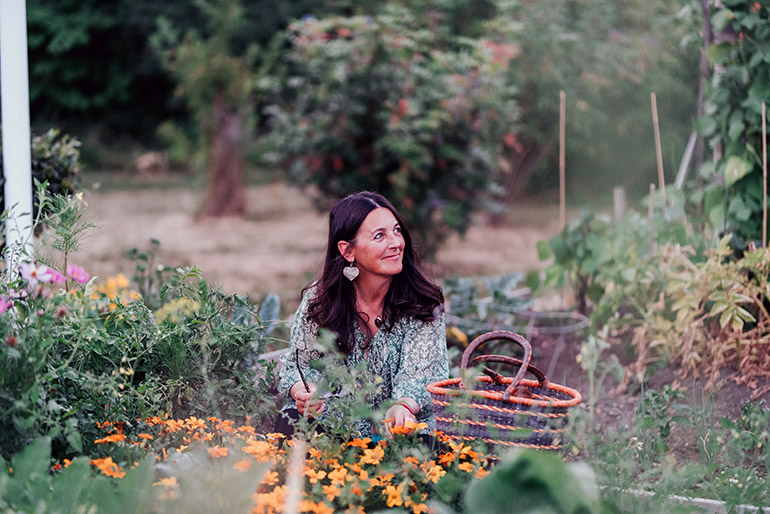
UBC researcher Joanne Taylor says shopping at a farmer’s market for local produce or using space in a community garden to grow fruit and vegetables are steps Canadians can take to protect their own food security. Photo credit: Nikita Shoots.
Food insecurity has long been an issue in Canada
As COVID-19 looms into the summer, international borders remain closed, a number of meatpacking and food processing plants are shut, and local farmers face a shortage of migrant workers to harvest crops. Indeed, prices have increased in grocery stores and the stark reality of supply and demand is hitting Canadians in the wallet.
Joanne Taylor is currently a Social Sciences and Humanities Research Council postdoctoral fellow in the department of economics, philosophy, and political science at UBC’s Okanagan campus. Her work explores the obstacles and challenges the agriculture industry and producers face while accessing a sustainable water supply for food production during impactful climate change scenarios. Taylor shares her opinion and philosophical approach towards food security, examining what COVID-19 has done to food supply and the real concern of food security across the continent
What is the best way to explain food security?
As defined by the United Nations Food and Agricultural Organization (UNFAO) food security exists when all people, at all times, have physical and economic access to sufficient safe and nutritious food that meets their dietary needs and food preferences for an active and healthy life. I suggest we use the term food insecurity, however, as social justice and food sovereignty issues such as ecological damage and greenhouse gasses are largely ignored when it comes to food production and supply. And disproportionate impacts of food insecurity are experienced by those who are most socially marginalized.
In the early stages of the pandemic Canadians experienced a shortage of yeast and flour and a limit on eggs. Is there more to come?
Yes. Since 2008 the global food crisis was identified by skyrocketing food prices, food riots and displacement of the impoverished, indicating that the current food system was not succeeding in eliminating poverty and food insecurity. Other challenges to our food supply include diminishing farmland lost to urban development, loss of healthy soils, forest fires—not to mention climate change-induced drought and flooding on agricultural land right here in the Okanagan.
There is also a dependence on western diets rich in meat and dairy, which rely on animal feed crops. In fact, the current COVID-19 crisis has most affected meat and migrant workers. Canada imports about 45 per cent of its domestic food supply while being the fifth-largest food exporter in the world. Some BC communities export 95 per cent of its produce creating a reliance on California for its fruit and vegetables where drought and forest fires are also prevalent.
How concerned should people be?
We should be genuinely concerned since the ability to be food secure is tied to personal financial ability to purchase food. As we are seeing, many social and environmental calamities are currently affecting not only our food supply but job security in the time of COVID-19—resulting in a decreased ability to purchase food. Increased food prices necessarily place further pressure on our personal or family budgets, creating scenarios where families may be in food-deprived situations.
What can the average household do to protect themselves in the future?
I believe that we should support our local farmers right here in our communities where an abundance of local, fresh, nutritious foods are grown. Shopping at farmers markets and grocery stores that support local producers builds resilient communities and decreases the impact on climate change-induced flooding and drought. Local food is also fresher and therefore more nutritious.
Should we all be growing our own fruit and vegetables?
Learning how to grow food either in your front yard or patio, in community garden plots, or even on borrowed land creates an understanding of how vitally important our food system is, especially when it comes under socioeconomic and environmental stressors.
We’re all thinking this will eventually be over, but will COVID-19 permanently affect Canadians’ food supply?
No one knows how long the current COVID-19 situation will continue or if international farm workers will be able to travel to our agricultural communities. It is therefore critical that we all learn the basics of how to procure local, nutritious foods with an understanding that we must be able to adapt to future climate change-related social and economic disruptions. It has never been more important to buy locally-produced food to support farmers and our communities. And as Canadians, we should never take fresh food and water for granted.
About UBC’s Okanagan campus
UBC’s Okanagan campus is an innovative hub for research and learning founded in 2005 in partnership with local Indigenous peoples, the Syilx Okanagan Nation, in whose territory the campus resides. As part of UBC—ranked among the world’s top 20 public universities—the Okanagan campus combines a globally recognized UBC education with a tight-knit and entrepreneurial community that welcomes students and faculty from around the world in British Columbia’s stunning Okanagan Valley.
To find out more, visit: ok.ubc.ca